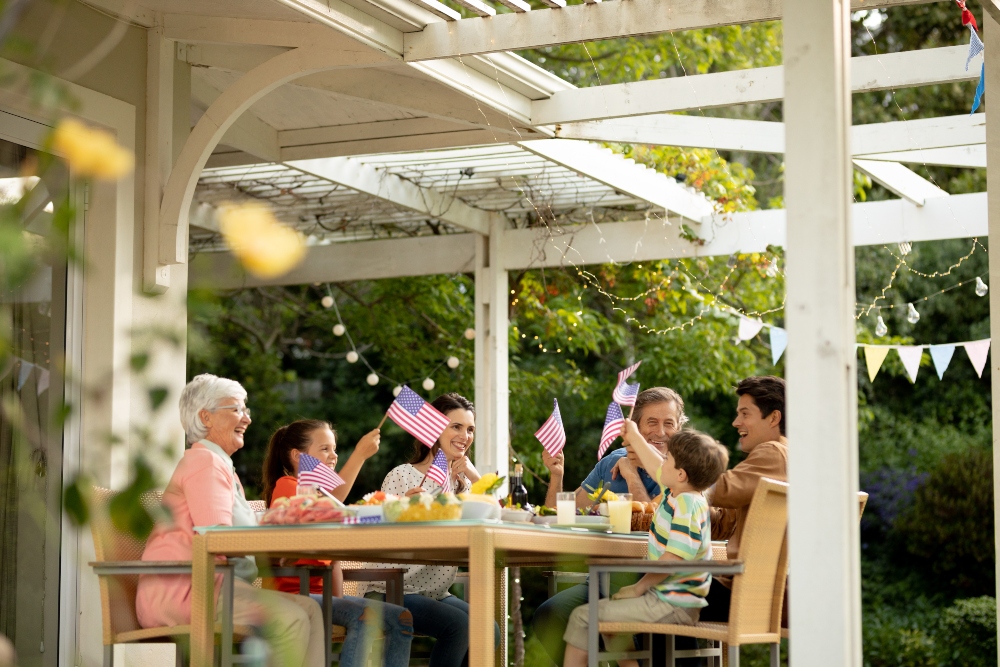
Low angle front view of a multi-generation Caucasian family sitting outside at a dinner table set for a meal, celebrating and waving US flags. Family enjoying time at home, lifestyle concept
Image source: Envato
As the world inches closer to normalcy, most people are eager to start seeing their families and friends again. If you have to hold a family gathering, you need to do it safely to protect your family members and the attendees. For starters, follow WHO safety guidelines – keep your mask on, wash your hands, and maintain social distance. Below are other tips to stay safe:
Invite Wisely – Let High-Risk Family Members Attend Virtually
Although everyone is susceptible to the virus, some people are more likely to end up in ICU and succumbing to the virus. If you have family members who are high-risk, you need to keep them off your invite list. You can use digital tools such as video calls to allow them to attend virtually. In case anyone in the gathering has the virus, you will have protected those who are more likely to succumb to the virus. If someone in your household is high-risk, keep the event out of your home as this puts them in danger. Anyone over 65, those with immunity issues, and people with chronic illnesses should sit out of the gathering. Avoid inviting those with conditions such as:
- Lung disease
- Diabetes
- Obesity
- Asthma
- Heart disease
- Liver disease
- Kidney disease
Limit the Number of Attendees
It is challenging to maintain social distance in congested areas. When planning a family gathering, reduce the risk by only inviting a few members from a few households. This way, there will only be a few people in your yard, and it will be easy to maintain social distance. If everyone stays in their corner, it will also make it easier for people to avoid touching surfaces that other people have touched.
If possible, only invite one other household to your family gathering
Family members who are always traveling, and those who work in congested areas where social distancing is challenging are at high risk of exposure. If you can keep out such people from your list of invitees, you will have helped every other attendee.
Use Plastic Recyclable Dinnerware
Family gatherings are centered around sharing food in the yard, but when you are facing a pandemic, it might be challenging to do so without putting your family at risk. You can protect everyone by using disposable but recyclable utensils. Buy plastic plates and cups and let everyone handle only the cutlery they will use during the event. After the event, everyone can take care of their own plastic plates, spoons, and cups or recycle as they please. Plastic items are great as you can serve freshly cooked meals off the grill. You can have one member from each family fill their platter and then share with other family members. The members of each household can then bring their drinks. You can also opt to buy pre-packaged meals and set them on separate distant tables for each household.
Hold the Gathering Outdoors and Maintain Social Distance
The easiest way to maintain social distance is to hold the event outdoors. Your backyard can be a great place where everyone stays apart and doesn’t touch surfaces in your home. You can set up your backyard with separate tables and chairs, allowing the households to mingle while still maintaining their social distance. Each family should have a separate table. On each table, ensure the family members have everything they will need, including hand sanitizer, disinfectant wipes, plastic dinnerware, coolers for their drinks, and anything else they need during the gathering. Even though you are outdoors, it is still important that you maintain social distance. You can do so by using barriers such as tables, and advising children to avoid closely interacting with each other. You should also keep your face mask on except when you are eating. However, a mask doesn’t mean that you should break social distance.
Conclusion
If anyone experiences COVID-19 symptoms during the event, they should be isolated. You should call the hospital or the virtual agent care numbers provided for your state, and have them checked. It is also important to follow the safety guidelines set by WHO and the state and federal governments. This is the only way to stay safe at all times.


